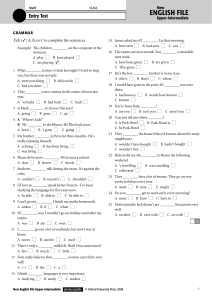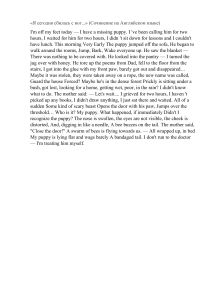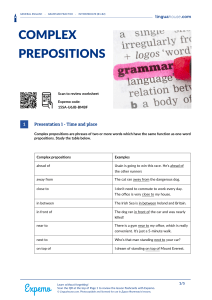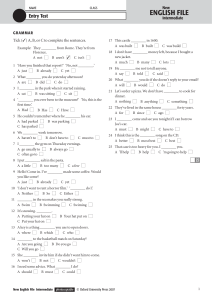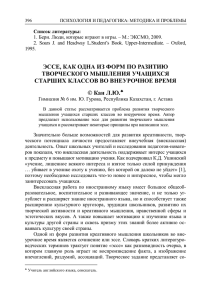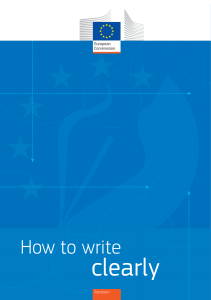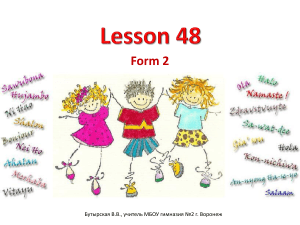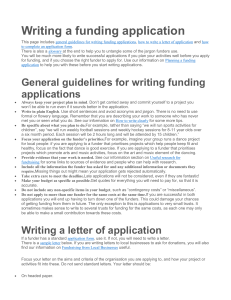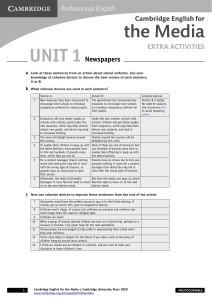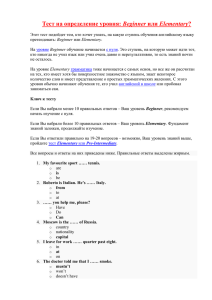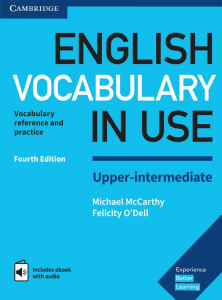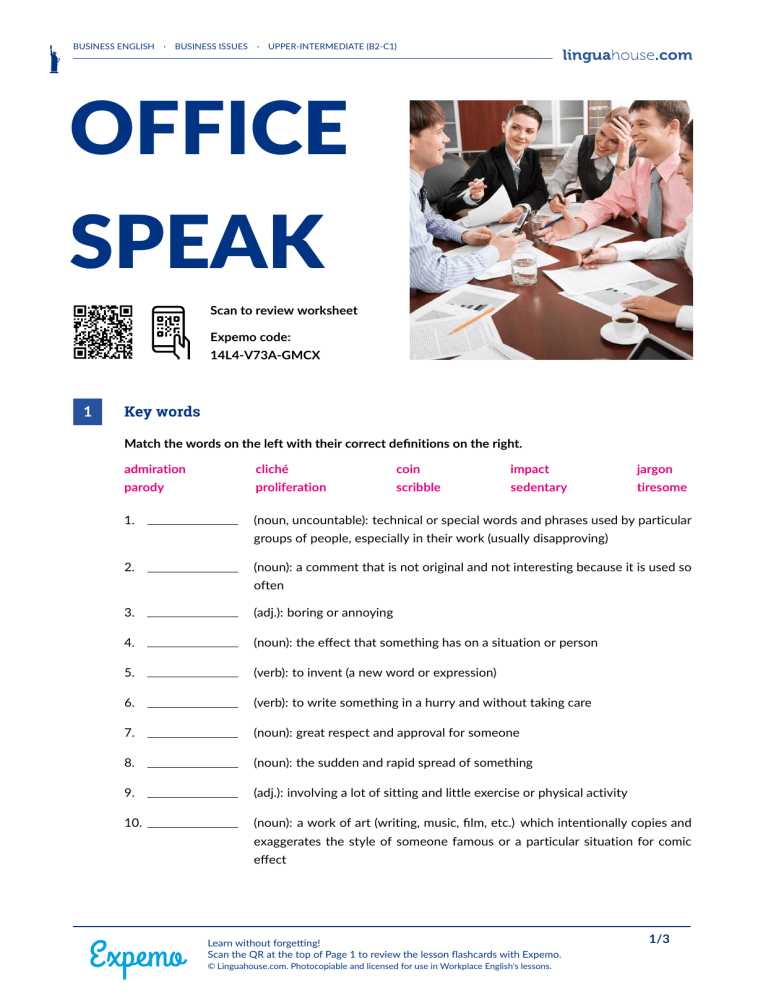
HEAAADERLOGORIGHT BUSINESS ENGLISH · BUSINESS ISSUES · UPPER-INTERMEDIATE (B2-C1) OFFICE SPEAK Scan to review worksheet QrrkoD Expemo code: 14L4-V73A-GMCX 1 Key words Match the words on the left with their correct definitions on the right. admiration cliché coin impact jargon parody proliferation scribble sedentary tiresome 1. (noun, uncountable): technical or special words and phrases used by particular groups of people, especially in their work (usually disapproving) 2. (noun): a comment that is not original and not interesting because it is used so often 3. (adj.): boring or annoying 4. (noun): the effect that something has on a situation or person 5. (verb): to invent (a new word or expression) 6. (verb): to write something in a hurry and without taking care 7. (noun): great respect and approval for someone 8. (noun): the sudden and rapid spread of something 9. (adj.): involving a lot of sitting and little exercise or physical activity 10. (noun): a work of art (writing, music, film, etc.) which intentionally copies and exaggerates the style of someone famous or a particular situation for comic effect FOOOOTERRIGHT Learn without forgetting! Scan the QR at the top of Page 1 to review the lesson flashcards with Expemo. © Linguahouse.com. Photocopiable and licensed for use in Workplace English's lessons. 1/3 HEAAADERLOGORIGHT UPPER-INTERMEDIATE (B2-C1) OFFICE SPEAK 2 Predict the answers Look at the following office clichés commonly used in Britain. Have you heard any of them? Match them to their correct meaning and read the article to check your answers. 1. Think outside the box a. do the most unpleasant task first 2. It’s not rocket science b. it’s not difficult to understand 3. Let’s touch base c. 4. Swallow the frog d. look at things from a new perspective 5. Push the needle e. make a brutal decision 6. Shoot the puppy f. take things to the next level let’s keep in contact A guide to office speak Few things are as irritating as the jargon of the modern workplace. But what do our everyday office catchphrases really mean - and where do they come from? 1. 2. It probably won’t surprise you to learn that "thinking 4. example, but it hardly has the impact in an office overused business cliché in the country, according environment these days that it might once have to a poll sponsored by the gaming company Ubisoft. enjoyed, since it is heavily overused. Word experts Apparently, "thinking outside the box", which refers believe this most patronising of phrases meaning to looking at things from a new perspective without "duh, are you stupid?" came into the American preconceptions, was invented by some suit in the business community’s consciousness during the Cold Walt Disney organisation years ago. War when rockets were first developed. Tiresomely The enough, it is even now being used by apparently- act of launching craft into space was considered serious office workers - not least a slogan by the so extraordinary that the science behind it was Welsh Development Agency. presumed to be extremely difficult. In fact, next time you’re on a British Airways flight else must be relatively easy. The big question is, look out for WDA’s little ad during the in-flight movie what phrase rocket scientists might choose to employ programme. when they decide to patronise one of their respected In Wales "thinking outside the box organisation’s thinking is obviously not sufficiently So anything colleagues? comes naturally", says the voice-over, although the 3. "It’s not rocket science" is another much-hated outside the box" has just been voted the most 5. Elsewhere, it is strange how the greyest of tribes (the "outside the box" enough for them to avoid using the accountants, the management consultants, the, oh cliché "think outside the box". dear, "senior executives" and "team leaders") have Anyway, you may agree with the poll’s verdict, or you managed to coin usages that, although now overused may disagree, having your own least favourite bit of and abused, were once colourful, fresh and filled business jargon. After all, there’s plenty of irritating with meaning. Once upon a time "let’s touch base" phrases that refuse to die. must have been a relatively charming way of getting a business "contact", if I can use that expression, to keep in touch. FOOOOTERLEFT When someone got up in a Learn without forgetting! Scan the QR at the top of Page 1 to review the lesson flashcards with Expemo. © Linguahouse.com. Photocopiable and licensed for use in Workplace English's lessons. 2/3 HEAAADERLOGORIGHT UPPER-INTERMEDIATE (B2-C1) OFFICE SPEAK Powerpoint presentation and said, for the first time the uninitiated and keeping them out. in human history, that they wanted their company though, it’s probably because there really isn’t much or department to "push the needle", meaning ‘take that is genuinely new for people in business to get things to the next level’, it must have stimulated corporate minds. "Swallow the frog" is a more recent Despite the proliferation of laptops and BlackBerrys and Excel spreadsheets, working in an office is as nicely expresses the idea of getting the nastiest task sedentary and limiting as it ever was. Some people of the day out of the way first. But soon, as with all love to "rebrand" old, tired ideas in different ways, its predecessors, it will quickly become tedious and often to justify their own existence. 8. The absurdities of office life, including its strange But why? Why bother with the expressions such language, have been joked about many times as "shoot the puppy" (meaning ‘make a brutal over the years but sometimes, as these examples decision’)? Partly it’s a matter of competition; the demonstrate, the world of bizspeak really is just more memorable and lightly amusing the words beyond parody... scribbled on a flip-chart, the more admiration the inventor will receive. Partly, it’s a matter of confusing 3 excited about. 7. innovation, which has not yet become boring and uninspiring. 6. Mostly, Adapted from The Independent, 23 November 2007 Checking understanding Put T (True) or F (False) next to the following statements: 4 1. The writer generally approves of office jargon. 2. The writer believes that office catchphrases have always been boring and meaningless. 3. All the office catchphrases mentioned in the article have been overused, according to the writer. 4. Office jargon is used to impress and confuse. 5. The writer believes that technology has made office life more exciting. Find the words Find the words in italics in the article and answer the questions. 1. If something is overused (P1), do you think it is used too much or too little? What is its opposite? 2. What do you think suit (P1) means? Is the word approving or disapproving? 3. Which word in paragraph 4 describes a phrase that is spoken to someone as if they are stupid or unimportant? 4. What do you think the writer means when he refers to accountants and management consultants as the greyest of tribes (P5)? 5. Find seven words and expressions in paragraphs 3, 4, 5 and 8 which describe how the writer feels about office jargon. FOOOOTERRIGHT Learn without forgetting! Scan the QR at the top of Page 1 to review the lesson flashcards with Expemo. © Linguahouse.com. Photocopiable and licensed for use in Workplace English's lessons. 3/3 HEAAADERLOGORIGHT UPPER-INTERMEDIATE (B2-C1) OFFICE SPEAK 5 Speaking Describe a situation when you had to ... think outside the box swallow the frog push the needle shoot the puppy Are there any overused business clichés in your language/country? Do you find any of them useful? FOOOOTERRIGHT Learn without forgetting! Scan the QR at the top of Page 1 to review the lesson flashcards with Expemo. © Linguahouse.com. Photocopiable and licensed for use in Workplace English's lessons. 4/3 HEAAADERLOGORIGHT TEACHER MATERIALS · UPPER-INTERMEDIATE (B2-C1) OFFICE SPEAK Key 1. 2. Key words 1. jargon 2. cliché 3. tiresome 4. impact 5. coin 6. scribble 7. admiration 8. proliferation 9. sedentary 10. parody Predict the answers 1. d 2. b 3. c 4. a 5. f 6. e Background to some office slang: Think outside the box This most common of business clichés originated from a nine-dot puzzle used in the Walt Disney Company. The solution to the puzzle involved drawing a line outside the nine-dot box. (See Wikipedia page: Thinking outside the box.) Push the needle This expression was inspired by motoring (the needle being the speedometer or rev counter). Shoot the puppy This phrase is thought to come from a satirical advertisement for a fictitious US game-show in the early 1980s, in which the audience would be offered money to shoot a puppy being held by a small child. The money on offer would then be reduced to see who would shoot the puppy just to get their face on TV. Swallow the frog This phrase first crops up in 1884 in Mark Twain’s classic novel, The Adventures of Huckleberry Finn. In it, Huck’s best friend, Tom Sawyer, says: "If you have to swallow a frog, don’t look at it too long." (which suggests that the more you delay doing something difficult or unpleasant, the worse it gets). Touch base This phrase has its roots in American baseball, where hitters must touch all bases before scoring a run. 3. Checking understanding 1. F 4. 2. F 3. F 4. T 5. F Find the words 1. too much, underused 2. a man who works in an office and wears a suit, especially a man with a high position in a company who is considered to lack human feelings and good ideas (disapproving) 3. patronising 4. He means they are boring. 5. irritating (P3), heavily overused (P4), patronising (P4), overused and abused (P5), boring (P5), tedious and uninspiring (P5), beyond parody (P8) FOOOOTERAPPENDIXLEFT Learn without forgetting! Scan the QR at the top of Page 1 to review the lesson flashcards with Expemo. © Linguahouse.com. Photocopiable and licensed for use in Workplace English's lessons. i
